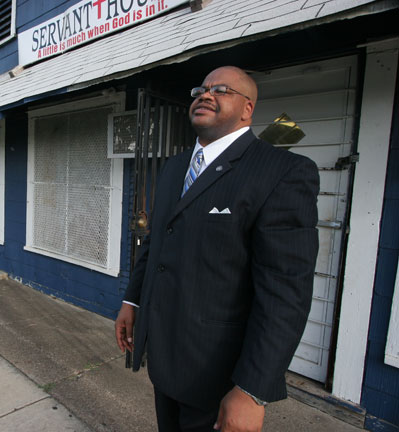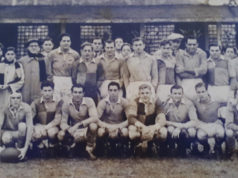Three months after their son died, Michael Jacobs Jr.’s parents still have obtained no ruling on his cause of death. That means they can’t get a payout from his modest insurance policy to help reimburse the individuals who stepped forward in April to cover his funeral expenses.

Jacobs, 24, didn’t die of a rare disease in a far corner of the world or under mysterious circumstances. He died in the front yard of his parents’ Eastside home shortly after being tasered by a Fort Worth police officer.
Police Chief Jeff Halstead promised that his department would conduct a full investigation into the death. But no results of any investigation have been released, and the case is still open – at least in part because there has been no official determination of the cause of his death by the Tarrant County medical examiner’s office.
A spokeswoman for the M.E.’s office said this week that the case is “still under investigation by our office” and that a ruling is expected “by the end of this month or the first week in August.”
Michael Jacobs believes racism was a factor in his son’s death and in the slow pace of official action since then. So do the Rev. Kyev Tatum and Eddie Griffin, two local African-American activists who have been trying to raise public awareness about the case.
“The police say they’re waiting on the M.E.’s report, and the M.E.’s office says they’re waiting on the police department,” Jacobs said. “Seems like they are just trying to sweep us under the rug.”
Tatum is angry about the relative lack of attention that city officials seem to be paying to Jacobs’ death, compared to the huge uproar that followed the Rainbow Lounge raid.
He understands why the gay community is upset at what happened in that raid and doesn’t begrudge them the success they’ve had in getting officials to take action, he said. He just wants to know why the Jacobs case isn’t also raising any appreciable outrage over what he sees as the same basic issue: the use of excessive force.
“Our issue is not to divide,” he said. “We want to invoke a substantive dialogue on the issue of excessive brutality by the Fort Worth Police Department and the sheriff’s department of Tarrant County.”
Tatum and Griffin believe they also see something else at work: intimidation by Taser International, the company that makes the electrical-charge weapons and that in recent months has been busy suing medical examiners in several states who have ruled that Tasers were a contributing cause in deaths.
“If [the medical examiner’s office] says the Taser caused the death … I assure you Taser International will sue,” Griffin said. “Chief Halstead … told me that [Taser International has] never lost a lawsuit.”
Tatum called the abusive use of the weapons “a new form of lynching,” with the same intent: “to inflict fear and control over people.
“Everyone is afraid of Taser International,” he continued.
It’s not true that Taser has never lost in court, though successes by its accusers have been few and far between. But the aggressive response of the Arizona-based company in suing medical examiners has drawn national attention. In a story in the Arizona Republic, which has written extensively about Taser-related deaths and controversies, Jeff Jentzen, president of the National Association of Medical Examiners, said the company’s actions are “dangerously close to intimidation.”
 In May, Tarrant County Medical Examiner Nizam Peerwani told Fort Worth Weekly that Taser International’s actions “can be very intimidating” (“Dissecting the Evidence,” May 27, 2009). “The whole issue with these weapons is a difficult one,” he said then. “What we can learn from history is that there are people in certain excited states who perhaps should not be shocked.”
In May, Tarrant County Medical Examiner Nizam Peerwani told Fort Worth Weekly that Taser International’s actions “can be very intimidating” (“Dissecting the Evidence,” May 27, 2009). “The whole issue with these weapons is a difficult one,” he said then. “What we can learn from history is that there are people in certain excited states who perhaps should not be shocked.”
He added that his office is “working on a case right now where the Taser was used, and we are looking at it very closely. And if we determine that the Taser was a contributing factor, we will be clear on that.”
Michael and Charlotte Jacobs called police on the morning of Saturday, April 18, because, Michael Jacobs Sr. said, their son, who suffered from a bipolar disorder, was “off his meds, and he’d got a little rowdy.” By that, Jacobs said, he meant that his son was talking loudly to himself in the front yard.
The same thing had happened several times, he said, and when police were called, “They usually would just come get him and take him to JPS [hospital].”
On that day, he said, when police arrived, they talked to Michael Jr. and appeared to have calmed him down. His son was backing away from the officers, the elder Jacobs said, and had not made any threatening moves. “His hands were down by his sides,” he said. But his son wouldn’t agree to get in the police car.
Jacobs said paramedics had arrived before his son was tasered and that the police officers “told them to leave.”
Halstead told city council members a few days later that police indeed had been told that the younger Jacobs had a history of mental illness and that he had not been taking his prescribed medications.
The chief told council members that the young man was “hostile and uncooperative” and “an obvious threat to himself and others.” The chief said the 24-year-old “became combative,” and when he continued to be confrontational despite warnings, one officer used the Taser on him “as trained to do in such circumstances.” Shortly afterward, Michael Jr. began to have breathing difficulties, paramedics were called, and he was taken to JPS, where he was pronounced dead.
The issue of police using Tasers to subdue mentally ill persons has repeatedly caused heated controversy in cities across the country. In 2007, Fort Worth police officials said department policy required officers to get medical assistance to a scene before a Taser was used, if a person was showing signs of drug use, mental instability, or medical distress. The policy now in effect includes no such prior requirement, and the reason for the apparent discrepancy could not be determined as of Tuesday. The current policy does prohibit Tasers from being used “against persons displaying passive noncompliance.”
Griffin and Tatum both have been part of efforts to draw national attention to what they see as a racial aspect of the Taser debate – the idea that, as with other weapons of force, law enforcement officers are more likely to use — and abuse — weapons against minority citizens than whites.
In Fort Worth, “excessive use of force mostly happens on the east side of I-35,” Tatum said.
Griffin, on his blog, encourages people to sign a petition to Congress asking for hearings on the question of Taser use and abuse. “We will not relent,” he said. “The death count is not going to go down.”
His site also links to Tasered While Black (taseredwhileblack.blogspot.com), a web site that tracks developments on the topic all over the world.
The same question of racial disparity has been raised in other cities. In Houston, for instance, police officials acknowledged in 2007 that the majority of those on whom Tasers had been used were black. Last year, in a small town near Jena, La., where questions of racial bias in the justice system have caused major civil rights demonstrations, a young black man died after being repeatedly tasered by a white police officer, who, according to news stories, wrote in his report that he applied repeated shocks because the man kept falling down and refusing to get back up.











